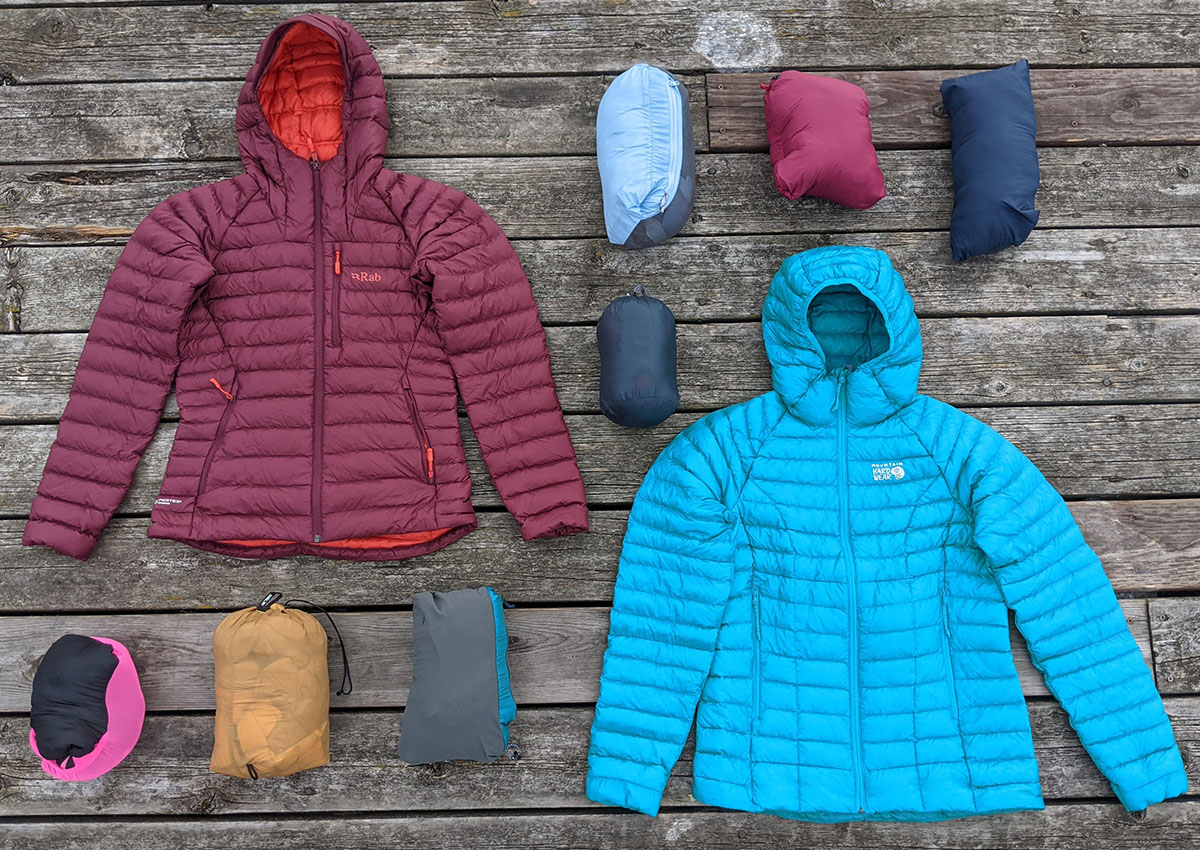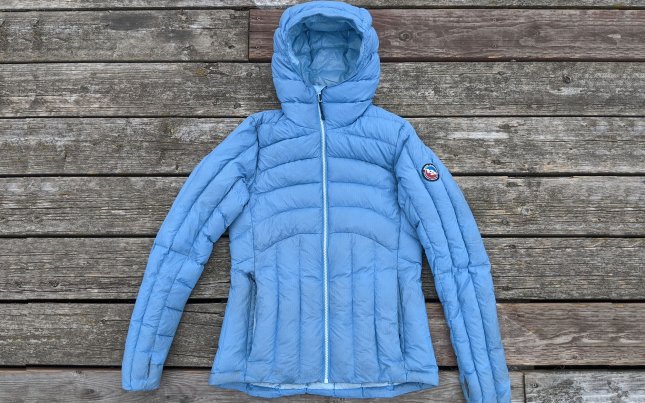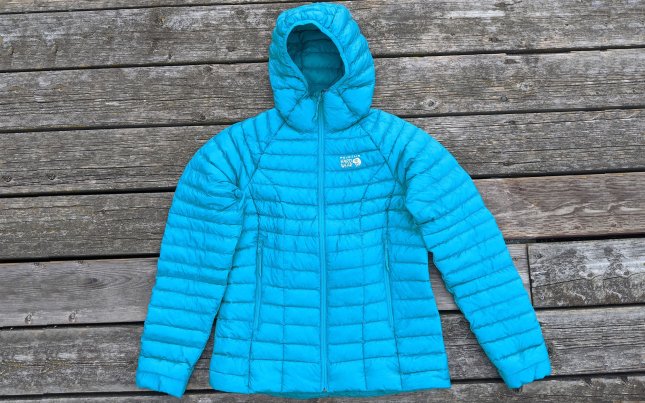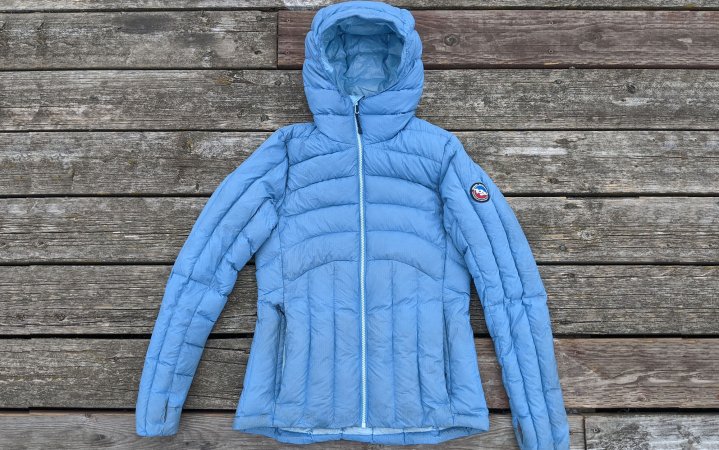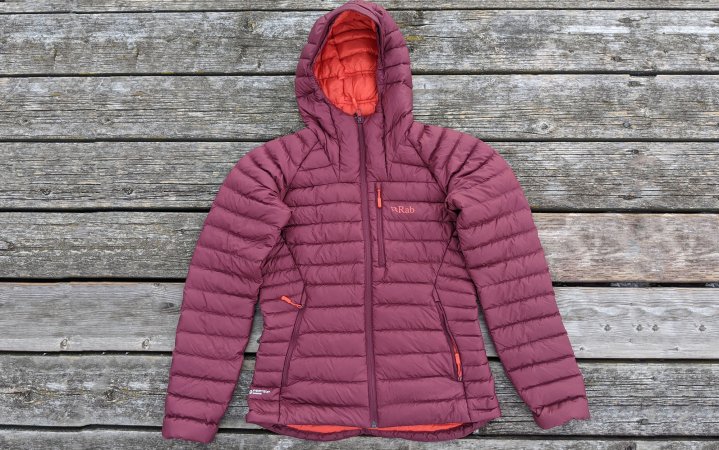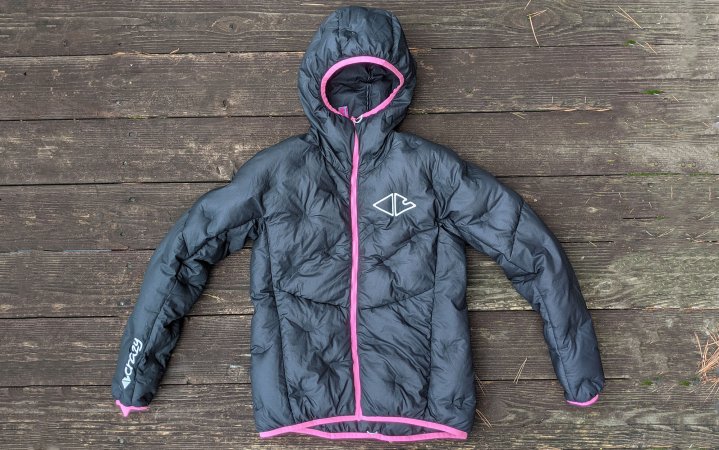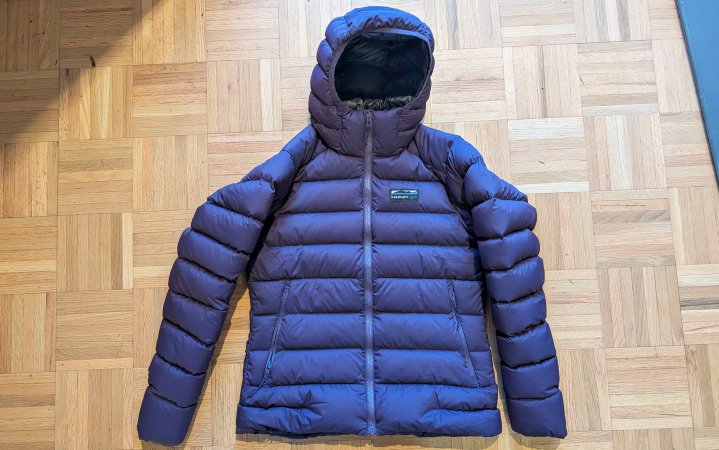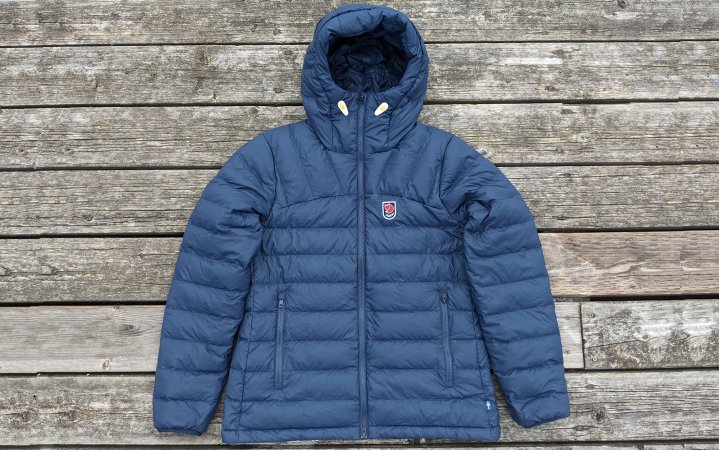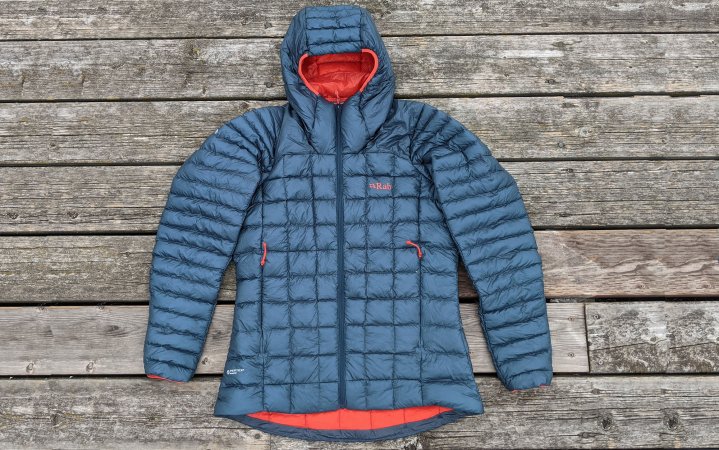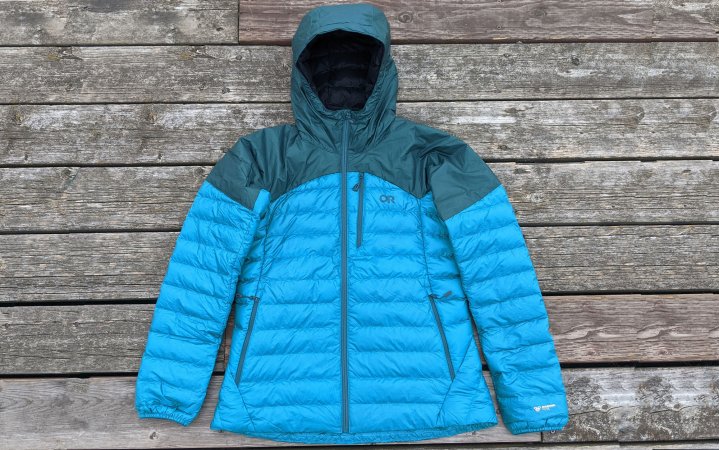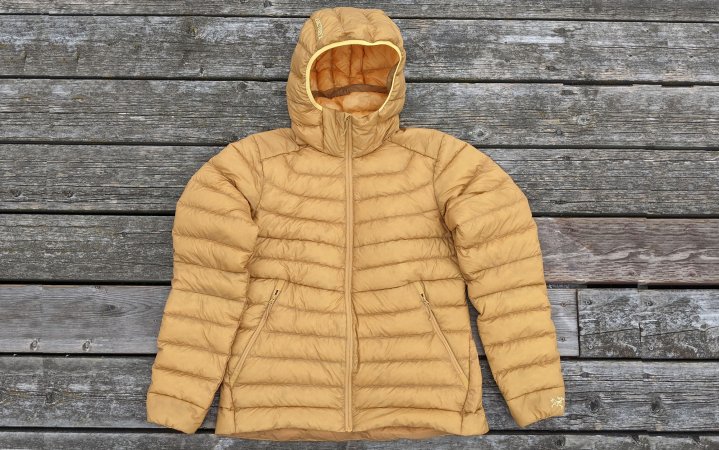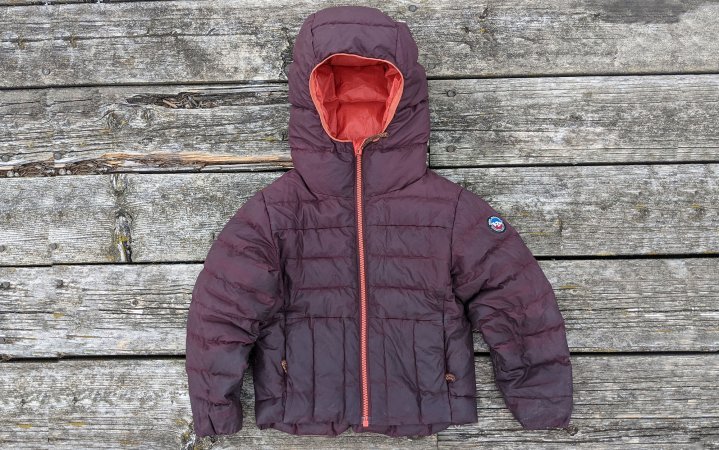We may earn revenue from the products available on this page and participate in affiliate programs. Learn More ›
Just about everyone these days is sporting a packable down jacket. Even where I live, in the gloom and mist of rain jacket country in the Pacific Northwest, puffer jackets have taken over. And the brands producing them — Mountain Hardwear, Arc’teryx, Big Agnes, Fjallraven, Cotopaxi, and more — are some of the biggest names in outdoor apparel. But with so many seemingly similar options to choose from, how do you know which are actually warm, and which are about aesthetics only? I put a dozen of the best packable down jackets to the test to see which would come out on top for warmth, weight, and packability across a variety of conditions.
- Best Overall: Big Agnes Women’s Luna Jacket/Men’s Shovelhead
- Best for Backpacking: Mountain Hardwear Ghost Whisperer 2
- Best Eco-Friendly: Rab Microlight Alpine Jacket
- Best Ultralight: Crazy Levity
- Katabatic Gear Tincup
- Fjallraven Expedition Pack Down Hoodie
- Rab Mythic Alpine Light Jacket
- Outdoor Research Helium Down Hoodie
- Arc’teryx Cerium Hoody
- Best for Kids: Big Agnes Ice House Hoodie
How I Tested the Best Packable Down Jackets
I considered a number of criteria for packable down jackets that are important for backpackers and backpack hunters, including packability, weight, water resistance, features, overall warmth, and price.
To test water resistance, I poured a quarter a cup of water over the back baffling of each jacket and then let it sit for two hours. I also tested the cuffs of each puffer jacket (a common fail point) for water resistance. First, I sprayed them with water from a spray bottle (mimicking the high humidity and mist that can be prevalent in popular backpacking locales), and let them sit for an hour. I then dipped them into a container of water for five seconds to see how easily (or if) they wetted out. I combined the results of these three tests to provide an overall picture of how well the puffer jackets resisted water.

To test packability, I started by stuffing each puffer jacket into its provided or attached stuff sack to see which packed down the smallest. I then checked to see how easily each down jacket fit into the smallest stuff sack (the Rab Mythic Alpine Light Jacket). I then combined those two metrics to give each down jacket a grade for packability, from extra small to large. When assigning these grades I kept in mind what size down jacket I was looking at (manufacturers provided a range of sizes from extra small to medium).

Overall warmth was tested using a walk-in refrigerator. I tested the jackets in August and this was the perfect way to achieve a cool, temperature-controlled environment. This also made testing more reliable because the temperature is posted right outside, ranging from 39-45. There was also no wind chill and constant low humidity to avoid skewing apparent temperature versus actual. In addition to assessing how comparatively warm I was between jackets, I also considered how much coverage was provided by the hood, as well as the functionality of drawcords at the hem and elastic at the cuffs.

I independently weighted each to confirm manufacturer specifications. Because of the nature of down there will be some variability in weight between products; as such, I have only noted those instances where there was more than a half ounce of discrepancy.
| Down Jacket | Buy It | Buy It | Price | Down Fill Power | Down Weight | Weight | Packed Down | Overall Warmth |
|---|---|---|---|---|---|---|---|---|
| Katabatic Gear Tincup | Men’s | Women’s | $300 | 850 fp | 4.7 oz | 11.1 oz | Large | Great |
| Outdoor Research Helium Down Hoodie | Men’s | Women’s | $300 | 800 fp | 2.6 oz | 15.4 oz | Medium | Fair |
| Fjallraven Expedition Pack Down Hoodie | Men’s | Women’s | $280 | 700 fp | 3.5 oz | 17.8 oz* | Large | Excellent |
| Mountain Hardwear Ghost Whisperer 2 Hoody | Men’s | Women’s | $360 | 800 fp | 2.9 oz | 7.8 oz | Small | Great |
| Rab Microlight Alpine Jacket | Men’s | Women’s | $300 | 700 fp | 5.1 oz | 14.6 ounces | Medium | Fair |
| Rab Mythic Alpine Light Jacket | Men’s | Women’s | $330 | 900 fp | 2.1 oz | 8 ounces | Extra small | Good |
| Arc’teryx Cerium Hoody | Men’s | Women’s | $400 | 850 fp | N/A | 10.2 ounces | Medium | Great |
| Crazy Levity | Men’s | Women’s | $650 | 950 fp | 2.4 oz | 6.1 ounces* | Extra small | Great |
| Big Agnes Luna | Men’s | Women’s | $300 | 700 fp | 6 oz | 13 ounces | Large | Excellent |
For packed size, ultralight backpackers should look for those packable down jackets noted as extra small, while large or medium puffers will be more appropriate for packing into checked luggage and the like. Excellent water resistance means that the down jacket completely resisted water absorption during my test (although I would not take that to mean they are waterproof) while fair notes instances where the water soaked either into the insulation of the jacket or completely through to the other side of the puffer. Overall warmth was judged to be excellent if at the end of my testing period in the walk-in cooler I felt comfortable enough to stay there indefinitely while fair packable puffers indicate instances where my teeth were starting to chatter.
Best Packable Down Jackets: Reviews & Recommendations
Best Overall: Big Agnes Women’s Luna Jacket/Men’s Shovelhead
Pros
- Warm enough for cold-weather camping
- Great features like a visor and thumbholes
- Excellent hood coverage
- Least expensive puffer jacket in my test
Cons
- A larger packed size
- Heavier than other picks on this list
Key Features
- Available Sizes: Men’s XS-XL, women’s XS-L
- Weight: 13 ounces
- Fill: 6 ounces at 700 fill power
- Down Certification: RDS
Test Results
- Warmth: Excellent
- Packed Down: Large
- Runs slightly small
Sure, I want a packable down jacket to weigh as little as possible and pack down small. But more than anything else, I want my packable down jacket to keep me warm. The Big Agnes Luna is not a midlayer for summer hiking at elevation, but a puffer stuffed with down that will keep you warm at an alpine camp when the temps drop. Even better, it’s got enough oomph to head out on snowy overnights.

I’ve been wearing the Big Agnes Luna (the women’s version of this jacket, the men’s version is called the Shovelhead) for over a year, and after testing out the competition, it’s staying in my rotation permanently. It’s not my first choice for ultralight backpacking (that’d be the Crazy Levity) or a backup layer for midsummer camping (go with the Mountain Hardwear Ghost Whisperer or Rab Microlight Alpine Jacket), but it’s what I grab for just about anything else. Autumn neighborhood strolls with the family: Luna. Winter backpacking trips: Luna. Shoulder season camping trips: Luna. I know it will keep me toasty warm in all those conditions and that’s the peace of mind I want.

My favorite detail about the Big Agnes Luna and Shovelhead is just how much down they packed in there. Even though it’s using a lower grade fill power than other packable down jackets on this list, it’s simply using so much of it (6 ounces) that it’s blowing the competition out of the water for warmth potential. In fact, it has so much down stuffed into it, that I suspect it’s not able to maximize the lofting potential of the 700 fill power, because there simply isn’t room for all of it to loft fully. But in truth I see that as a plus. It means that I don’t have to worry about losing warmth with every inevitable wisp of down poking through the shell layer. There’s plenty more inside.
The details of the Big Agnes Luna and Shovelhead are also among my favorites of any puffer jacket I’ve looked at. The hood is extremely generous, which I love on days when the wind is kicking up and I want to shield the side of my face. The thumbholes on the sleeves are perfect for when I want a bit of extra warmth for my hands.

While the Big Agnes Luna performed perfectly in the cold room test, it struggled with the water resistance testing. While the down retained its loft no matter what I threw at it (the sheer quantity of water-repellent down coming into play here), the fabric itself absorbed, and passed through, a significant amount of water. I suspect what’s going on here is that the sheer amount of use this puffer jacket has gotten has caused its water-repellent finish to completely wear off. The finish here is made from a PFOS and PFOA-free formula. While much better for the environment and human health, it may need to be refreshed more often.
Best for Backpacking: Mountain Hardwear Ghost Whisperer 2
Pros
- Great warmth to weight to price ratio
- Great weather resistance (although the down is not treated with a hydrophobic wash)
Cons
- Slightly more expensive than other picks on this list
- Not warm enough for shoulder season or winter backpacking
Key Features
- Available Sizes: Men’s S-XXL, women’s XS-XL
- Weight: 7.8 ounces
- Fill: 2.9 ounces at 800 fill power
- Down Certification: RDS
Test Results
- Warmth: Great
- Packs Down: Small
- Run slightly large
The Mountain Hardwear Ghost Whisperer 2 is something of a mainstay among backpackers. Most of us have owned this coat at least once, and when we’re evaluating a potential new insulative layer, it’s what we’re comparing it against.

After testing some of the best packable down jackets from other top brands, the Mountain Hardwear Ghost Whisperer 2 is still one of the best options for backpackers there is. It’s very lightweight—in my test, the only thing lighter than it was the Crazy Levity. It’s surprisingly warm for that weight, too, keeping me comfortably warm during the freezer test.
The cuffs of the Mountain Hardwear Ghost Whisperer 2 have some synthetic fill to prevent them from wetting out. Most backpackers have experienced the cuff of their down jacket poking out from underneath their rain shell on bad-weather days, and inevitably getting wet. After fully submerging the Ghost Whisperer cuffs in water, I shook them dry and they lofted perfectly. The only sign that they were wet, in fact, was the thin strip of fabric running around the inside, which held more moisture than anything else.
The rest of the jacket was so effective at repelling moisture, in fact, that it was completely dry on the underside after two hours with a quarter cup of water sitting against the back. Still, be careful to keep this one under one of the best backpacking rain jackets when you’re out in the backcountry: The down is not treated with a hydrophobic wash.

I also liked the coverage on the Mountain Hardwear Ghost Whisperer 2. The small size easily covered my unusually long (19 inches) torso, and the hood wrapped comfortably around my face, providing plenty of coverage around my neck and jawline. If you’re looking for a lightweight insulative layer to get you through chilly mornings and evenings in the alpine, this is an excellent choice.
Best Eco-Friendly: Rab Microlight Alpine Jacket
Pros
- 90 percent of the jacket is made from recycled materials
- Affordably priced
- Small packed size
- Wide range of available sizes
Cons
- Not as warm as other packable down jackets
- Somewhat heavy
Key Features
- Available Sizes: Men’s XXS-XXL, women’s XXS-XXL
- Weight: 14.6 ounces
- Fill: 5.1 ounces at 700 fill power
- Down Certification: RDS
Test Results
- Warmth: Fair
- Packed Down: Medium
- Runs large
Not only does the Rab Microlight Alpine Jacket have impressive environmental bonafides compared to other packable down jackets, it has impressive bonafides compared to just about any piece of outdoor gear. A full 90 percent of this jacket is made from recycled materials. Not 90 percent of the shell material; 90 percent of the entire jacket. That is beyond impressive.

In addition to using 100 percent recycled material for the shell material, Rab also uses 100 percent recycled down for the fill with the Rab Microlight Alpine Jacket. The recycled down comes from duvets, pillows, and old down sleeping bags and jackets (you can even get a free label to recycle directly with Rab if you are in the UK). Rab is also a certified Climate Neutral Company. And they’ve achieved all this without an increase in price—the Rab Microlight Alpine Jacket was one of the more affordable options I looked at.
Unfortunately, there were some performance issues. Despite being treated with a hydrophobic wash, the down matted during my test of the cuffs. When I left a quarter cup of water on top of the jacket, it all soaked through the Pertex shell in two hours—one of the worst performances in my test. That being said, the skin feel of the material is excellent—as long as you are careful not to leave it in a puddle of water, most people will be satisfied with its performance.

The Rab Microlight Alpine Jacket also struggled during the cold-room test. I was fairly cold while wearing this jacket alone at a temperature range of 39 to 45 degrees Fahrenheit. Keep this one on hand for summer camping and shoulder season errands, but if you need some serious performance out of your packable down jacket, other options on this list will serve you better stead.
Best Ultralight: Crazy Levity
Pros
- Extremely lightweight
- Surprisingly warm
- Packs down small
Cons
- Very expensive
- Scant on features
Key Features
- Available Sizes: Men’s S-XL, women’s XS-L
- Weight: 6.1 ounces (manufacturer specs: 5.4 ounces)
- Fill: 2.4 ounces at 950 fill power
- Certification: Downpass
Test Results
- Warmth: Great
- Packed Down: Extra small
- Runs true to size
The warmth to weight of the Crazy Levity is off the charts. It weighs over an ounce less than its closest competitor (the Mountain Hardwear Ghost Whisperer 2) and was just as warm, if not warmer than that jacket. It also puffs up seemingly instantly; no waiting around for the jacket to loft. And, of course, it packs down very small: the second smallest packed size in my test.
There are a couple of ways the Crazy Levity pulls off this impressive feat. The first is to simply use the highest grade down it can: 950 fill power to 1000 fill power. And it doesn’t skimp on it either. A full 2.4 ounces of the total 6.1 ounces of the jacket are down. Next is a unique approach to baffling. Rather than sew in traditional baffles, they have small ovals glued in at periodic intervals that helps to keep the down separated and evenly distributed. I’ve been wearing this jacket on a regular basis for months and have not noticed any cold spots as a result of unevenly distributed down, so I’d say it’s plenty effective.

The Crazy Levity also dispenses with anything resembling an extra. There is only one zip pocket on the jacket (inside at the right waist) and there are no drawcords or adjustment points to cinch the hem or the hood, just a touch of elastic to hold it in place. During testing, however, this felt like enough. I couldn’t feel the cold creeping in anywhere. The fabric is also not especially water repellent (despite being treated with DWR) and absorbed essentially all of the water during my test of water resistance (the jacket still lofted fine, however). And remember all that premium down I mentioned? That’s part of the biggest drawback of the Crazy Levity. Its price point is hundreds of dollars more than anything else I’ve looked at.

Most people will likely look at the Crazy Levity and decide (rightly) that it’s not for them. But if you’d pay almost anything to scrap a couple of ounces from your pack weight, it’s a must have.
Read the full review: Crazy Levity: Can a Super Ultralight Puffer Actually Keep You Warm?
Katabatic Gear Tincup
Pros
- Warm
- Affordable
- Durable exterior
Cons
- Less packable than others that I looked at
Key Features
- Available Sizes: Men’s S-XXL, women’s: S-XXL
- Weight: 11.1 ounces (manufacturer specs: 11.0 ounces)
- Fill: 4.7 ounces at 850 fill power
- Down Certification: RDS
Test Results
- Warmth: Great
- Packed Down: Large
- Runs true to size
The Katabatic Gear Tincup has quickly become one of my favorite down jackets. It’s very warm, nearly as warm as the Big Agnes Luna and Fjallraven Expedition Pack Down Hoodie, with no cold spots to speak of. It’s got an impressive and durable exterior fabric that doesn’t catch easily, but a smoother interior fabric that’s silky smooth to the touch. The fit is great for individuals with average silhouettes (and they have an impressive range of sizes), and this is easily one of the lower-priced options that I looked at.
Really the only ding on this jacket is that it’s not especially packable for a down jacket. If you’re just looking for an everyday piece that you can stuff into your hiking backpack it will work just fine, but if you’re looking to maximize packed space for travel or backpacking, go with another pick on this list.
Fjallraven Expedition Pack Down Hoodie
Pros
- Very warm
- Affordably priced
Cons
- Not as water resistant as others that I looked at
- Boxy silhouette
- Heavy
Key Features
- Available Sizes: Men’s XS-XXL, women’s XXS-XL
- Weight: 17.8 ounces (manufacturer specs: 15.3 ounces)
- Fill: 3.5 ounces at 700 fill power
- Down Certification: Down Promise
Test Results
- Warmth: Excellent
- Packed Down: Large
- Runs large
After a couple of packable down jackets had left me shivering during the testing period, I decided it was time to break out the heaviest option in the arsenal, the Fjallraven Expedition Pack Down Hoodie, for a change of pace. I was not disappointed. The jacket was warm from the moment I put it on and only got warmer as time went on. At the end of the testing period, I felt I would have happily stayed in the cold room even longer. In addition to being plenty warm, the Fjallraven Expedition Pack Down Hoodie is also affordably priced (only the Big Agnes Luna/Shovelhead was less).
The downside to the Fjallraven Expedition Pack Down Hoodie is that it is heavy and bulky, noticeably more so than the Big Agnes Luna that I tested while only providing marginally more warmth. It wouldn’t be my first choice for a backpacking trip, including in winter, for that reason. I also found that it had a fairly boxy silhouette, which is neither as flattering or as efficient an insulator as more streamlined options.

One detail that I really appreciated about the Fjallraven Expedition Pack Down Hoodie was the fleece around the neck hole of the jacket. During the winter months I often pull the cowl in as close as I can to keep my mouth and nose from getting cold, which can lead to not insignificant moisture buildup. The addition of a touch of fleece there will help ensure that it stays comfortable even after getting a little damp.
Rab Mythic Alpine Light Jacket
Pros
- Great water resistance
- Lightweight
Cons
- Not quite as warm as other picks on this list
Key Features
- Available Sizes: Men’s S-XXL, women’s XS-XL
- Weight: 8 ounces
- Fill: 2.1 ounces at 900 fill power
- Down Certification: RDS
Test Results
- Warmth: Good
- Packed Down: Extra small
- Runs true to size
If you’re planning a fast-and-light trek that’s going to put all your gear to the test, then take a close look at the Rab Mythic Alpine Light Jacket. During testing it showed excellent water resistance, very near on par with the Outdoor Research Helium Down—at half the weight. It packs down very small, thanks to its 900 fill power it packed down smaller than anything else I looked at.
It wasn’t quite as warm as the other backpacking-ready packable down jackets I looked at, like the Crazy Levity or Mountain Hardwear Ghost Whisperer 2, but you’re not really planning to hang around camp, or even really take any breaks at all right? This is the puffer you want on hand when you hit the ridge and a wall of wind (mixed with mist) blasts you in the face. Just throw this on and keep moving until you’re warmed back up. When it’s time to remove this layer again, you’ll barely notice the weight or volume it takes up in your bag.
Outdoor Research Helium Down Hoodie
Pros
- Most water resistant packable down jacket I tested
- Extra durable waterproof material on the hood and shoulders
- Great range of sizes available
Cons
- Heavy
- Not as warm as other options I looked at
Key Features
- Available Sizes: Men’s S-XXXL, women’s XS-4X
- Weight: 15.4 ounces
- Fill: 2.6 ounces at 800 fill power
- Down Certification: RDS
Test Results
- Warmth: Fair
- Packed Down: Medium
- Runs true to size
If you tend to be pretty hard on your gear then you’ve probably been avoiding packable down jackets. Delicate nylon shells with even more delicate down can spell big trouble if you find yourself plowing through soggy brush. One tear (and they are pretty easy to tear) and the guts of the whole thing—hundreds of dollars of down—go flying everywhere. Worse, at the first hint of moisture, down starts to mat, losing its insulative properties. Forget your shell layer and you’re screwed.
If that sounds like you, then you should consider the Outdoor Research Down Helium Hoodie. It was the outright winner of my water resistance testing, with no water penetrating through the jacket after two hours. Impressive stuff. The water was sitting at the intersection of the Pertex Quantum fabric (the majority of the shell) and the Quantum Shield with Diamond Fuse fabric. This fabric, which is located at the hood and shoulders, is both significantly more durable than typical packable down jacket shells and actually waterproof: a major asset if an unexpected storm kicks up.

The downside to this jacket is twofold: It wasn’t particularly warm compared to other options I tested, and it’s fairly heavy. Grab this one if you’ll be working up a light sweat in a cool rain.
Arc’teryx Cerium Hoody
Pros
- Very warm for its weight
- Great water resistance
- Good range of sizes
Cons
- Expensive
Key Features
- Available Sizes: Men’s XS-XXXL, women’s: XXS-XXL
- Weight: 10.2 ounces
- Fill: 2.6 ounces at 800 fill power
- Down Certification: RDS
Test Results
- Warmth: Great
- Packed Down: Medium
- Runs slightly small
Arc’teryx is known for making premium outdoors products at a premium price, and their Cerium Hoody was no exception. It was noticeably warmer during testing than the Crazy Levity, Mountain Hardwear Ghost Whisperer 2, and the Rab Mythic Alpine Light Jacket while only weighing a couple ounces more. It also had an excellent performance during the water resistance test, with the cuffs only matting slightly when fully submerged in water. Only a slight amount of moisture soaked through when I left a quarter cup of water on the back for two hours.
But, it is more expensive than everything but the Crazy Levity. If you’re looking for more warmth than backpacking standards like the Ghost Whisperer provide but don’t want the bulk of a winter-weight puffer like the Big Agnes Luna, then the Arc’teryx Cerium Hoody may be the middle ground you are looking for.
Best for Kids: Big Agnes Ice House Hoodie
Pros
- One of the warmest puffer jackets for kids available
- Extremely durable
- Smallest size fits older toddlers
- Affordably priced
Cons
- None that I’ve found
Finding high-quality outdoor clothing for kids can be challenging, as plenty of pint-sized apparel is built with the idea that you’re going to take a break from your outdoor pursuits now that you’re a parent. But you aren’t, are you? Yeah, me either. So the gear we get for our kids needs to be able to keep up with the gear we already have for ourselves.

That’s what the Big Agnes Ice House is. I’d say it’s like the mini version of my best overall pick—the Shovelhead/Luna puffer jacket—since it shares some basic design similarities, including the generous hood and collar, drop-tail hem, and lots and lots of puff (600fp vs the 700fp of the adult version). But honestly the Ice House might be even better. My kid wore the smallest version of the Ice House hoodie for two years, and it went through the wringer: snow, rain, wind, mud, sand, juice spills, pasta dinners. I never washed it. It still looks great. The only problem with it is that she simply grew out of it. Time to order the next size up.
The Rest of the Field
I checked out what is arguably the most popular packable down jacket—the Cotopaxi Fuego. While it performed perfectly fine in all my tests, it didn’t particularly shine in any of them. It repelled water in the cuff test, but a quarter cup of water soaked through the back when left to sit for two hours. The Fuego was middle of the road for packability. It was reasonably warm in the walk-in fridge test, but not outstanding for its weight or price.
Read Next: The Best Down Jackets
And while Cotopaxi’s B corp bonafides are impressive, the recycled content of the Rab Microlight Alpine Jacket puts it in a class of its own for eco-consciousness. My take is that if you already own the Cotopaxi Fuego, you should feel confident that you have a high-performing packable down jacket. But if you are looking to upgrade or purchase one for the first time, one of the other options I tested is likely to be a better fit depending on your priorities.
I tried one cheaper puffer jacket option in the run up to this test: the Decathlon Forclaz Women’s MT100 Hooded Down Puffer Jacket. Unfortunately, despite its low price, I think this is one to steer away from. In my experience, this coat simply doesn’t loft, even when left unpacked for long periods of time or worn during brisk walks. Better to spend more on a premium packable down jacket and get some real warmth-to-weight benefits.
Read Next: The Best Base Layers of 2023
Things to Consider Before Buying a Packable Down Jacket
Fill Power and Fill Weight of the Best Packable Down Jackets
It’s become increasingly popular to advertise the fill power used in the best packable down jackets. But what is fill power? Fill power refers to the total volume taken up by an ounce of fully lofted down at various grades. Higher grade down can capture more warm air than lower grade down, and so will take up more volume. An ounce of 450 fill power down takes up 450 cubic inches. An ounce of 900 fill power down takes up 900 cubic inches. There are huge weight savings that come with using higher grade down, but at a higher cost.
Less often advertised, but still important, is the fill weight: That’s how much of that down is actually in the packable down jacket. (See our table above for information on the fill weights of different packable puffer jackets). Even if a jacket is using 900 fill power down, if it’s not using very much of it, it will only be so warm. Conversely, a down puffer jacket stuffed to the brim with 550 fill power down may be quite warm.

But even if you know both of these metrics, you still don’t have the full picture of warmth. The design and distribution of down across a jacket can affect warmth. The potential for cold spots—areas the down has shifted away from—can also affect your experience. Features like drawstrings at the hem as well as the hood and cuff design can allow or prevent cold air from creeping in. Finally, if down is packed in too tightly, it can prevent it from fully lofting, diminishing the warmth potential of the weight and fill power grade.
Chris Curtis, senior product manager for Outerwear at Mountain Hardwear explained another complicating factor: The blend of feathers to down can vary considerably when purchasing bulk down. “800 fill power down insulation could be a mix of 95 percent down plumules and 5 percent feather, or 90 and 10 percent or 85 and 15 percent,” he said. “But since the heat trapping properties of the down plumules is greater than the feathers, the 95/5 blend is statistically warmer than the 85/15, even if both are 800 fill power.” While brands can specify a certain blend, sometimes that blend simply isn’t available, and they will compensate by adjusting how much fill is used in different parts of the puffer coat.
Read Next: How to Layer for Hiking
RDS Certification of the Best Packable Down Jackets
While most down is a byproduct of the food industry, its popularity as an insulation material has led to unethical practices in the past: namely, live plucking and force feeding of geese. Because down is in virtually all cases sourced from a third-party supplier, it can make it difficult for manufacturers to independently verify that animals were treated humanely in the harvesting of goose and duck down. Responsible Down Standard (RDS) is a certification that verifies that there was third-party verification that all animals were treated humanely in the creation of a down garment.
While RDS is the main certification for down garments, there are a couple of others that are common as well, including Global Traceable Down and Downpass.
Shell Material of the Best Packable Down Jackets
Most packable down jackets are made with a nylon shell and DWR finish. The shells typically are made in varying thickness measured in denier (D): usually these range from 10D to 30D.
Pertex is also a common type of nylon used for packable down jacket shells, which provides an extra degree of protection from water.
Water Resistance of the Best Packable Down Jackets
While down jackets and down coats have a reputation for losing their effectiveness in wet conditions, my tests showed that today’s breed of packable down jackets, complete with DWR treatments on the shell and hydrophobic treatments on the down themselves, are actually quite effective at repelling light rains. However, these treatments will wear off over time. If you frequently wear your down jacket out without a shell cover, plan to refresh the water repellency on a regular basis with products like Nikwax’s hydrophobic down treatment.
Hood Coverage of the Best Packable Down Jackets
The best packable down jackets will always have hoods, but the amount of coverage provided by each hood varies considerably. If you plan to use your down jacket as a standalone piece (i.e., without a balaclava or scarf) then check that it provides sufficient coverage of your head and face.
Read Next: The Best Puffer Pants
FAQs
You can check the relative warmth of many best-in-class down jackets by reviewing our table, which shows the results of side-by-side testing. Generally, “fair” ratings should be saved for cool summer evenings, while good and great rated jackets can be worn into the shoulder season months. Down jackets rated excellent are those that I would wear in below-freezing conditions.
Packable jackets, including down coats, can be good for winter, if they have sufficient down fill. I recommend either the Big Agnes Luna or the Fjallraven Expedition Down Pack Hoodie for anything down to 20 degrees Fahrenheit.
While packable down jackets are not fully waterproof, they are quite water resistant. Look for down coats that advertise DWR treatments and hydrophobic fills: These can handle short spurts in light rain.
You can wash packable down jackets, but to protect the down for the long-term it is important to use detergents created specifically for down, like those from Nikwax.
Yes, all down jackets will lose a feather from time to time. This is normal and to be expected. Try to not pull on them when you see them as that can inadvertently result in holes in your down jackets.
Read Next: The Best Thermal Underwear for Women
Final Thoughts on the Best Packable Down Jackets
Whereas high-quality packable down jackets were once the purview of mountaineers, backpackers, and backpack hunters, more and more people are discovering their incredible warmth-to-weight potential. After years of trying out different models of packable down jackets, I tested models from eight of the biggest brands for this story, including Outdoor Research, Cotopaxi, Arc’teryx, Rab, Big Agnes, Crazy, and Mountain Hardwear. I was impressed by all of them, but a few really shone through and are now my go-to staples for everything from trips to the grocery store to overnights in the alpine.
- Best Overall: Big Agnes Women’s Luna Jacket/Men’s Shovelhead
- Best for Backpacking: Mountain Hardwear Ghost Whisperer 2
- Best Eco-Friendly: Rab Microlight Alpine Jacket
- Best Ultralight: Crazy Levity
- Katabatic Gear Tincup
- Fjallraven Expedition Pack Down Hoodie
- Rab Mythic Alpine Light Jacket
- Outdoor Research Helium Down Hoodie
- Arc’teryx Cerium Hoody
- Best for Kids: Big Agnes Ice House Hoodie
